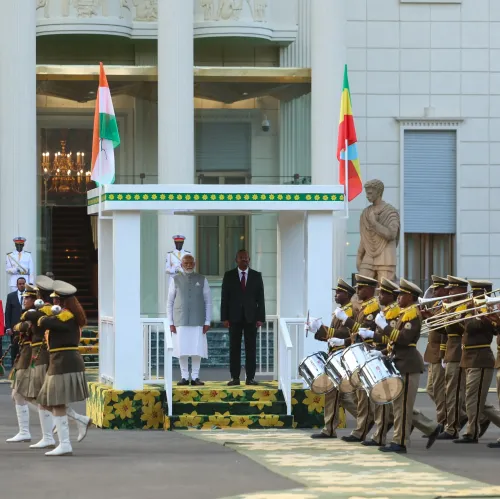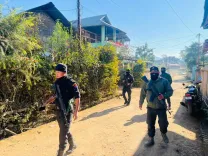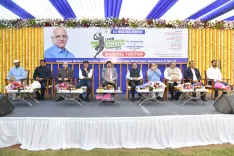The Vested Property Act: A Challenge for Hindus in Bangladesh

Synopsis
Key Takeaways
- Hindu population decline: Significant decrease from 18.4% in 1961 to 7.95% in 2022.
- Out-migration: Mass Hindu migration, particularly to India, due to socio-political factors.
- Legislative impacts: Various acts have facilitated property dispossession of minorities.
- Restoration efforts: The Vested Property Restoration Act 2001 aimed to return properties to rightful owners.
- Implementation gaps: The new act is yet to be fully implemented, necessitating expert consultation for amendments.
The Vested Property Act in Bangladesh has profoundly impacted the Hindu community, evidenced by data showcasing a persistent and silent exodus of Hindus from Bangladesh since the Partition. The percentage of Hindus in the total population fell from 18.4% in 1961 to 12.1% in 1981, 10.5% in 1991, and down to 9.2% in 2001. In contrast, the Muslim population's share rose from 80.4% in 1961 to 86.7% in 1981, 88.3% in 1991 and 89.7% in 2001. By 2007, estimates suggested that the Hindu population might have further declined to 8%, while the Muslim population surged to 92%. The figures from 2011 (8.5%) and 2022 (7.95%) reflect a continuing decrease in the Hindu population over the years.
This decline can be attributed to a steady and silent out-migration. According to estimates, assuming the Hindu population was 18.4% in 1961, the expected size of the Hindu population in 2001 would have been 22.8 million, rather than the 11.4 million recorded in the census, indicating a significant mass out-migration, primarily to India. The census data shows 1.8 million Hindus missing between 1981 and 1991, and 2.8 million between 1991 and 2001.
The acceptance of the two-nation theory by the Muslim League in the 1930s fostered a Muslim identity politics that became integral to the official discourse in Pakistan. This was particularly consequential for the Hindu landed gentry in what became East Pakistan. The violence of the Partition compelled many Hindus to flee, especially from Punjab and the Bengal border, with waves of migration peaking during communal riots in the 1950s and 1960s, before and after the 1965 Indo-Pakistan War. This mass out-migration posed administrative challenges in managing the properties left behind by evacuees. To address this, the Pakistani state enacted various detrimental laws and ordinances, reinforcing the legacy of communal politics.
The Enemy Property (Custody and Registration) Order II of 1965, enacted during the Indo-Pakistan War, was particularly destructive to communal harmony in East Bengal. Prior to this, several smaller acts were implemented to manage evacuee properties, culminating in the 1965 Act. These included the Government of East Bengal Requisition of Property Act (Act XIII of 1948), the East Bengal Evacuees (Administration of Immovable Property) Act of 1951, and the East Pakistan Disturbed Persons Rehabilitation Ordinance of 1964. Collectively, these acts provided the state with the justification to intervene, oversee, and ultimately transfer evacuee properties, alienating Hindu minorities in Bangladesh and other religious and indigenous communities from their rights to property management.
Upon Bangladesh's independence, the Enemy Property Act should have been abolished, as it contradicted the spirit of the 1972 Constitution and the Declaration of Independence (April 10, 1971). However, on March 26, 1972, the government enforced the Bangladesh Vesting of Property and Assets Order, treating properties left behind by Pakistanis and enemy properties as a single category. In 1974, the repeal of the 1969 Ordinance did not eliminate the enemy properties, which continued to be managed under the Vested Property banner.
In 1976, the Bangladesh government repealed the previous Act only to reinforce its provisions further. The government was not only tasked with managing the vested properties but also with disposing of or transferring them on a long-term basis. This indicated an increasingly hostile political and legal environment for minority communities, where land dispossession became a high-stakes game at the administrative level, heavily influenced by vested political interests.
A study estimated that the true value of lost assets for an average affected Hindu household due to the EPA/VPA from 1965 to 2006 would amount to Tk. 889,517. Dispossession occurred through various illegal means, including collusion between illegal occupants and land officials, violence over control of harvests, forced evictions by authorities, forgery, and using the death or migration of family members as a pretext for land occupation.
When the Awami League came to power in 1996, it responded to internal pressures by passing the Vested Property Restoration Act 2001 during the 22nd session of the Jatiyo Sangsad (National Parliament) on April 11, 2001, repealing the Vested Property Act. This new Act aimed to return vested properties to their rightful owners and outlined procedures for doing so. While welcomed, the Act faced criticism from civil society groups who called for amendments to ensure better protection for victims of land dispossession. As it stands, the implementation of this new act remains incomplete, and further consultation with experts and civil society is needed for potential amendments.
(Deepak Kumar is a New Delhi-based foreign and strategic affairs analyst. The views expressed are his own.)










